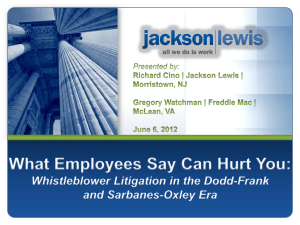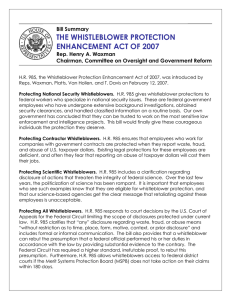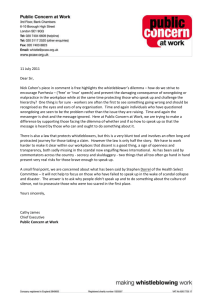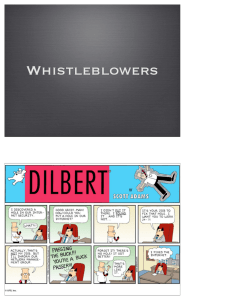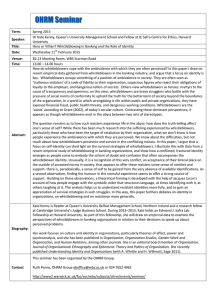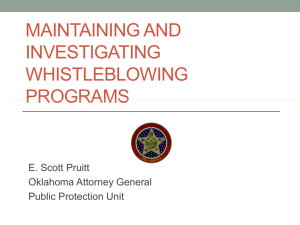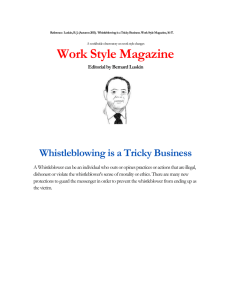Developments in whistleblowing research 2015
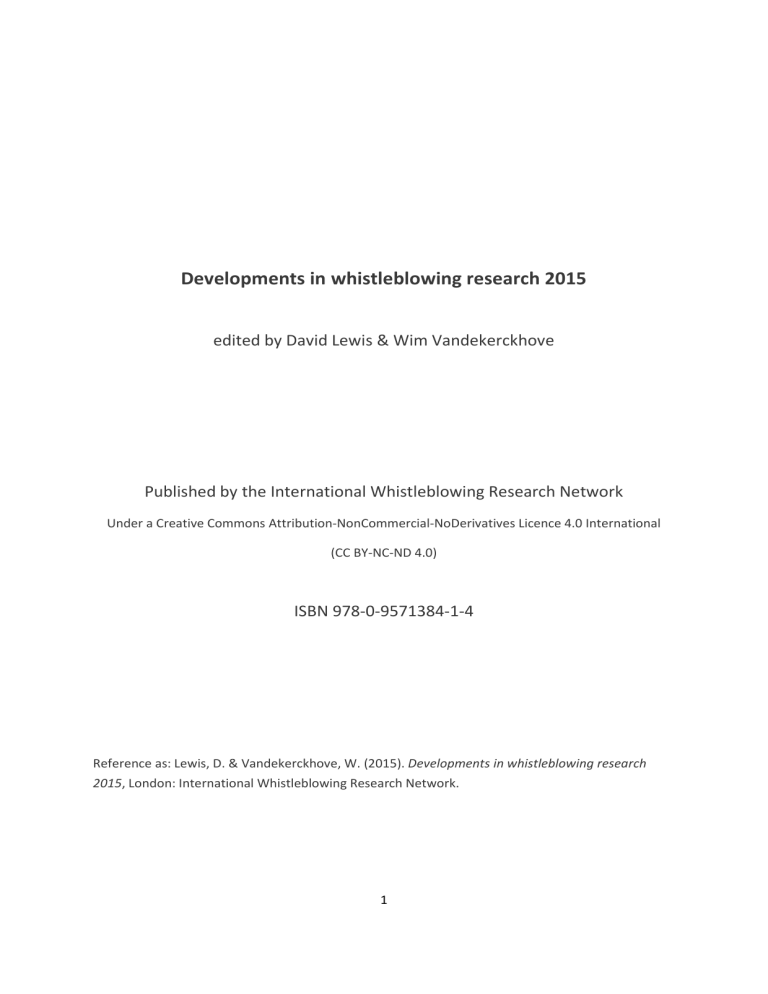
Developments in whistleblowing research 2015
edited by David Lewis & Wim Vandekerckhove
Published by the International Whistleblowing Research Network
Under a Creative Commons Attribution-NonCommercial-NoDerivatives Licence 4.0 International
(CC BY-NC-ND 4.0)
ISBN 978-0-9571384-1-4
Reference as: Lewis, D. & Vandekerckhove, W. (2015). Developments in whistleblowing research
2015 , London: International Whistleblowing Research Network.
1
8. Whistleblowing And Mental Health: A New Weapon For Retaliation?
Prof Marianna Fotaki, Dr Kate Kenny, and Dr Stacey Scriver 1
Warwick Business School, Queen’s University Belfast, School of Political Science and
Sociology NUI Galway
Marianna.Fotaki@wbs.ac.uk
Whistleblowing involves speaking out, often jeopardizing one’s own position and that of one’s colleagues. It involves breaking existing norms of silence and taking risks with unknown outcomes. All of this means that whistleblowing is a stressful endeavor. For this reason, most whistleblowers understandably seek counselling at some point in the process
(Alford, 2001; Rothschild & Miethe 1999). Jean Lennane, the former President of
Whistleblowers Australia, wrote about the impact of whistleblowing on mental health in the
1990s and described the resulting isolation, removal of normal work, denigration, demanding or impossible orders and referral for psychiatric assessment (Lennane,
1996/2012). She also explained how these lead to many whistleblowers losing their jobs and homes, facing expensive lawsuits, divorce, alcohol abuse, attempted suicide and bankruptcy. Despite such interventions, existing literature on whistleblowers’ experiences in organizations tends to overlook the issue of mental health.
Whistleblowers occupy something of an ambivalent position in society. Though the logic of democratic institutions is dependent upon courageous individuals speaking up to publicize wrongdoing in government (Harding, 2014), public (Fotaki and Humantito, 2015) and commercial institutions (O’Brien, 2003; Kenny, 2014), such individuals are often seen as either ‘traitorous violators’ of a code of fidelity to their organization, or as heroes: martyrs to the cause of transparency and openness (Grant, 2002). Within this prevalent ‘saint or villian’ dichotomy, there is little in-depth understanding of the high price that whistleblowers often pay for their decision to disclose wrongdoing. The ‘afterlife’ of many whistleblowers, once the media and public attention their disclosures attract is over can involve a broken career, personal and financial problems, and mental health issues (Smith,
2014).
There is considerable evidence that persons who raise concerns about a danger, risk, malpractice or wrongdoing that affects others in the workplace, can suffer reprisals at the hands of an employer or fellow workers (Burrows, 2001). According to an NBES report,
1
We are very grateful for the assistance of advocacy groups including: Transparency International Ireland, the Government
Accountability Project, Washington DC, and Whistleblowers UK.
106
more than one in five (22 percent) of workers who reported misconduct in 2011 in the USA also said they experienced retaliation for doing so, representing a 15 percent increase from two years ago. Employers and fellow workers may resort to reprisals against those who raise concerns in order to protect the reputation of the organization or of a fellow (often senior) worker (General Medical Council, 2015). Those who utilize an external reporting channel are more likely to be retaliated against (Mesmer-Magnus & Viswesvaran, 2005;
Vandekerckhove et al., 2014). Crucially, the characteristics of the wrongdoing - its frequency and whether or not it is deeply systemic - are positively associated with the likelihood and severity of retaliation (Mesmer-Magnus & Viswesvaran, 2005). The level of retaliation often reflects the magnitude of threat represented by the whistleblower’s disclosure to the organization’s future performance (e.g. Miceli & Near, 2002). This suggests that some organizations will respond defensively to whistleblowers’ reports of wrongdoing by deploying all means at their disposal to protect themselves against what is perceived to represent a threat to their survival, even if it hurts and often destroys whistleblowers. This can lead to a cycle that begins with informal bullying and ostracization, dismissal from work and concomitant financial problems, all way thorough to a broken career, the depletion of one’s own resources and support networks, and mental health problems for the whistleblower.
The aim of this study is to move beyond the dichotomy of whistleblowers as saints or villains in order to examine these psychological and social implications for individuals who perform their duty and/or act selflessly in protecting the public interest. Our aim is to use psychosocial frames to extend theorizing on how individuals are implicated in the flows of power through their act of transgressing the social norms operating in the organizations they work for, and how organizations punish and discipline them for such transgression. We then examine how, when one finds oneself outside of the social norms, an individual’s perception of self is put in question and a painful sense of alienation can result. We take theoretical inspiration from the post-structuralist philosophy of Michel Foucault and Judith
Butler who develops his theories by inflecting these through Lacanian psychoanalysis. We discuss these theories in brief before we present our methodology and findings. The study concludes by discussing implications for theory development and policy.
Theoretical Framework
Michel Foucault’s work on social norms acting as a discursive form of power can shed light on how definitions of mental illness can construct boundaries around what is considered normal, and how these boundaries can change over time (Foucault, 2006). Systems of knowledge are co-implicated with the in power relations they are meant to serve and are simultaneously a product of these relations. The power-knowledge nexus is expressed through dominant discourses in any given historical period. Foucault has shown how madness, for example, is not a pre-given entity, but something constituted historically
107
through discourses as both an object of knowledge and a target of institutional practices.
Madness is the product of a discourse. Meanwhile ‘professional’ psychiatric knowledge invents, molds, and carves out its object: mental illness (Townley, 1993). For Foucault however, power is multidirectional and productive; individuals internalize it as they subject themselves to social norms, but they also resist it by transgressing and interpreting them in accordance with their desires -the exercise of power by authorities is never total and complete. This contention is important for understanding both the whistleblower’s motivation to report wrongdoing, and their predicament following the disclosure which can act as a form of power interplay between individual and the organization.
Judith Butler, a feminist philosopher and an avid reader of Foucault’s work, elaborates on the processes by which individuals internalize these norms through affective appropriation that allows them to exist socially. She developed this by infusing it with psychoanalytic conceptions of subjectivity from Jacques Lacan (Butler, 1997a). Specifically, we draw on her idea that a longing for recognition by our immediate environment (friends, family, coworkers etc.) and through symbolic values (such as loyalty to profession and living through one’s own ethics) is a precondition for having a socially viable existence. This recognition through societal norms is conveyed to us by others from an early life, and in fact constitutes us as subjects according to Lacan. The Lacanian subject does not possess a defined and retrievable identity but discovers this through a chain of symbolic significations in relation to literal others (e.g. a carer early on in life) and symbolic norms and prohibitions encountered later on in life (the big Other) while continuously negotiating its desire in relation to these
(for a fuller explication, see Fotaki, 2009). Butler uses this notion to theorize individuals’ attachments to their identities. Such attachments might even cause subjects to detach themselves from their own embodied feelings, so they can exist socially (Butler, 1990).
Kenny (2010) applied Butler’s development of the concepts of ek-stasis and passionate attachment to explain why people denigrated in the workplace still cling to their jobs.
In this chapter, we use the concept of passionate attachments by individuals to their own identity as dutiful, loyal and committed to his/her organization to explain how whistleblowers may find themselves outside of organizational and social norms while trying to live by and uphold them. Next we discuss methodology and the findings of the study, before proceeding with their analysis in light of the proposed framework.
Methodology
This study utilizes a qualitative interview methodology for data collection and an inductive approach to data analysis that adapts the methodology set forth by Gioia et.al. (2013) for use in this context. Fifteen semi-structured in-depth interviews were conducted with whistleblowers in Ireland, the UK, the US and Europe. The majority of interviews were carried out face-to-face with a small number conducted over the phone where interviewees
108
were unavailable for in-person interviews. Most interviews were conducted on a single occasion, with two interviews carried out over two sessions.
Data Collection
Interviewees were identified through whistleblower networks, searches in newspapers and on-line media under the term ‘whistleblower’ and ‘whistleblowing’, via advocacy groups 2 and through a snowballing methodology once interviews began. A key informant interview with a psychologist who works with whistleblowers was also conducted, resulting in a total of 15 interviews. A short interview guide was prepared with open-ended questions designed broadly to allow interviewees to narrate their ‘story’. Interviewees were given scope to provide narrative responses with interviewers following the natural arc of the ‘conversation’ seeking clarification or asking further questions as they arose naturally. Interviews lasted between 30 minutes and 2 hours. Interviews were voice recorded and then transcribed verbatim. In the following account we have anonymized participants’ names.
Ethical Considerations
Whistleblowing is often a psychologically harrowing experience. To minimize any potential distress caused through participation in the interviews, all interviewees were fully informed about the nature of the study prior to participation. Consent was sought for participation and to use the results of the interview in subsequent publications. Interviewees were also informed of sources of support, such as whistleblowing organizations. In some cases, consenting interviewees were put in contact with one another following the interviews in order to facilitate peer support. These measures were considered important to avoid unnecessary distress; indeed, many of those interviewed for this project spoke about the anxiety they felt in even revisiting the painful memories of the past, and sharing their experiences with us. However, studies on interviewing with vulnerable populations have found in the main that participation in research is often a positive experience and most research subjects do not suffer adverse consequences (Biddle et.al. 2013).
Data Analysis
The analysis for this paper followed an inductive, iterative process that consisted of multiple stages of analysis followed by reflection and validation and further analysis, in accordance with what Hammersley & Atkinson describe as ‘a reflexive process operating through every stage of the project’ (1995:24). Analysis of interview texts involved content analysis carried out through an adaptation of the approach outlined by Gioia et.al. (2013). This, as the authors explain, ‘provides a systematic approach to new concept development and grounded theory articulation that is designed to bring “qualitative rigor” to the conduct and presentation of inductive research’ (Gioia et al. 2013: 15). This approach was selected for
2 We are very grateful for the assistance of advocacy groups including: Transparency International Ireland, the Government
Accountability Project, Washington DC, and Whistleblowers UK.
109
the following reasons: to avoid researcher bias, to provide space for the subject’s ‘voice’ to be heard and to ensure the greatest possible rigor and validity to the findings.
Findings
Our findings are presented in two parts. First, we outline the ways in which mental health struggles came to the fore at different stages in the process of whistleblowing. From initial spotting of wrongdoing and gathering evidence, through to making one’s claim to the organization and on to the aftermath of whistleblowing, stress is everywhere. We present people’s experiences to illustrate this. The second part of our findings details the actual impact of mental health problems on the process and the outcomes of whistleblowing attempts. Here we show that mental health and stress are not ‘neutral’ phenomena but in fact have distinct material and political effects that must be taken into account. Discussion of the literature is woven through our data presentation, for the sake of continuity. For reasons of space, we are limited in the data we can present here, but further details are available elsewhere (Kenny, Fotaki and Scriver, forthcoming).
Part 1: Mental Health And Phases Of Whistleblowing
While every person’s story is different, many whistleblower experiences have some basic
‘phases’ in common. At the outset, the person becomes aware of the problems that they feel are unacceptable and must speak out about. Typically, one next raises these issues with a superior or an external body. If the problem is not dealt with by this party, one can find oneself locked in an ongoing struggle with the organization that can lead to resignation or redundancy on the part of the whistleblower. The journey rarely ends there, and can lead to years of conflict through for example protracted legal struggles. As will be detailed here, each stage can give rise to distinct stresses and yield mental health problems for the person involved.
Stage 1: Preparing to whistleblow and the associated stresses
Whistleblowers interviewed for the project described what it was like to go through the actual processes of whistleblowing. It typically involved secrecy, as people gathered the information that they would need in order to make their claims heard about the wrongdoing they witnessed. This secrecy was a key source of stress. One respondent described the nature of the stress she felt, and how it was ever-present:
I didn't cry. I think I was more… you're on an emotional roller coaster. You are up and down, and up and down, all the time [Joyce].
Similarly, another respondent talked about how he felt an ever-present fear of being
110
caught.
It was awful, like, to be honest. I was lying to everybody [Adam].
As many others found, the ‘early’ part of the whistleblowing process, when the person is secretly involved in gathering information about what has happened, is stressful. The cause of stress often relates to the internal conflict of having to fight against one’s organization.
Let us not forget that many whistleblowers are often the most loyal employees, who tend to disclose from a genuine desire to help their organization (Alford, 2001; Rothschild & Miethe,
1999).
Stage 2 Stresses: Challenging the Organization
The next stage for many whistleblowers involves a public or at least overt challenge to the organization. This is particularly the case where internal whistleblowing procedures have failed to offer an effective means of making one’s disclosure, as was the case with all our respondents. For many, this is the beginning of an ongoing battle in which the whistleblower is trying to seek support and gain attention for the problems they have witnessed. This phase, the struggle with the organization, is rife with stress.
For example, Joyce speaks of a creeping self-doubt that came about from trying to defend herself during her court case against her former employer, after she spoke publicly about the problems at a big building society operating in Ireland.
To prove anything like that, it was really, really stripping me apart. I had to have everything, but how do you prove that? You have to be so [sure], one hundred per cent sure that everything is right…
Liam who reported a case of corruption involving arms contracts notes how it was almost the source of his undoing:
They really… they almost got me. They almost got me. Psychologically they almost got me. I think it had been working on me for some time [Liam].
He describes his wife’s reaction at the time:
I know that at one point in time she was very worried about me as to whether I was going to survive. You know, I went through a horrible, depressive year [Liam].
In Liam’s case, as with many others, challenging the organization was a difficult process .
Stage 3 Stresses: Retaliation from the organization and mental health
111
Many, not all, whistleblowers experience retaliation from their organization, having spoken out. Retaliation can come in many forms, but it often consists of what one respondent described as a strategy of: ‘deny, delay, destroy’. Each of these moves on the part of the organization can have its own part to play in diminishing the mental health of a whistleblower.
In Georgia’s case, when she spoke out about problems in her former organization, its response was to continually chase her husband for outstanding mortgage loans and demand that these would be immediately repaid. Her husband had worked for the same organization, a bank. Naturally this was a very difficult task indeed:
W hat they did, because obviously they wouldn't give him the finance to finish the houses….then they sacked him, so he didn't have a source of income. And they were threatening him because obviously if you don't have any money, you can't pay the mortgage and yet they were threatening etcetera., etcetera., over arrears.[Georgia]
It was the struggle against the bank and the severe retaliation that resulted from their side, that led to mental health issues.
Georgia describes also the frequent bullying and harassment that she experienced, noting that it was a deliberate ploy to grind her down:
‘ They wanted to see me break’.
As with other whistleblowers, in John’s case, the organization dictated that he go through some mental health counseling, as a prerequisite.
John felt that having been put on psychiatric support essentially undermined the validity of his whistleblowing claims
So, basically, then what happened is that I'm then… then they put me on psychiatric support at the Priory Clinic. So, what they do here is they pacify you as somebody with mental health issues. Therefore, there's no validity [John].
Retaliation by the organization can, as others’ testimony shows, take its toll on one’s mental health.
Stage 4 stresses: Being outside of the organization
A common aspect of whistleblowing involves leaving the organization as a result of one’s disclosure, either by choice or being “forced out”. Finding oneself alone and unemployed can be a key source of stress:
E ven though you know in your heart of hearts you have done the right thing…um…it is terribly difficult not to… If I'm unemployed…..you know, your sense of self esteem is going to be destroyed. [Greg]
As Greg points out, knowledge that one has done the right thing is some comfort but offers scant assistance when one’s financial situation, health and self-esteem have been damaged.
112
Health and self-esteem, he notes, are related to being part of a ‘normal working environment, and so can be damaged when this source is cut off:
So, yes, I mean, you know…if you are out of a job because you are a whistle blower and you are cut off from the normal working environment, you know, colleagues etc., etc., you are not….you don't have that fundamental measure of your worth, which is a salary…um…you know, you're self esteem will be very badly affected. [Greg]
Michael describes how it is to be on the outside of the organization, all of a sudden, and how this can feel from a mental well-being perspective:
You are not at work, right? You're at home, right, because you're on sick leave or because you're on … anyway. So all day long, you're churning this. You're not sleeping right, whereas they've got a job to do and they're not thinking about it at the same intense levels and at the same analysis that you apply to it [Michael]
What Michael notes could be considered as situational- his mental well-being is fundamentally changed because of the situation that he finds himself in. It is interesting to see how it feels to be on the outside looking in. This response, to ask the whistleblower to leave albeit temporarily, is a common one in organizations. Such a situation can lead to something of a spiraling downwards as prolonged unemployment leads to further deterioration of self-esteem, which in turn contributes to a difficulty in getting work.
Furthermore, those who are accused of wrongdoing also suffer stress if suspended pending investigation; a long wait for a verdict is difficult to cope with as for example in Tom’s and
Greg’s case.
Our study also showed that contributing to this is a sense of isolation that emerges from the many cases in which whistleblowers find that their former colleagues don't want to keep in contact with them, because of the stigma that they bear.
Interestingly, for some whistleblowers, they preemptively isolate themselves, being already reflexively aware that their whistleblowing status renders them somewhat stigmatized in their organizations.
Overall, we can see how being outside of the organization, whether one has left voluntarily or been forced out, has many sources of stress and pain attached.
Stage 5 Stresses: When one’s name is public
Some whistleblowers find that because of their disclosures, their names have become public. This can itself lead to much difficulty from a mental health perspective. Georgia for example described how seeing her name in the newspapers for speaking out about her bank had led to panic attacks. It came to a head one night, when the widely-publicized TV program was to be screened, which featured her interview and accusations against her former employer:
113
Yeah, like I'd get palpitations and a few panic attacks when that used to happen, and
I opened that front page [Georgia] .
This stress was not unfounded, some people reacted badly to the news and publicly accused her of disloyalty. Even some of her neighbors ostracized her because of the publicity:
There are people… across the road who won't speak to me. And another man who kept telling me, you know, “What you should do is, you should leave the country, just leave the country, leave the country…” Like ,you tell me to leave the country like,
“go!” A lot of people are like that [Georgia].
Georgia is not alone, research into whistleblowing shows that while people can find themselves isolated and singled out in their own organizations, they can likewise be shunned by those outside, even for years afterwards (Rothschild, & Miethe, 1999, Devine &
Maassarani, 2011, p.16-17).
Part 2: The Consequences Of Mental Health Issues
Having outlined the various ways in which stress develops and builds, and mental health issues emerge during the whistleblowing process, it is important to turn to the effects of these. Experiences of stresses by whistleblowers are not neutral, but have distinct results.
Consequence 1: The temptation to give up
Whistleblowers often find that the stresses described above are just too much to cope with, and they give up. One whistleblower for example describes the strong temptation to “give up the fight’ because of the sheer difficulty in coping with this kind of issue
I feel hugely….It’s depressing to fight against so many people. And to be let down time and time and time again. You think maybe this person will give me a remedy and you know, it doesn’t happen. It’s completely gut wrenching to be honest. I mean…..um, you know, um, I don’t know, people I suppose, quite often people do give up. I mean a lot of other people go on and get nowhere [Greg].
So although he disagreed with the idea of settling and wanted to continue the struggle, the pressure he was under eventually forced a settlement. This was not uncommon. Tudor gave up the fight against the bank too:
I probably did the wrong thing and instead of standing my ground, I actually took the easy way out, which was take the other job just simply because by now my health was beginning to suffer so I'm starting to have anxiety problems, stress related issues, not sleeping, psoriasis, abdominal problems and I just wanted out. I just didn't
114
want to deal with it anymore [Tudor].
Again, the stress is ‘just too much’ and he wants out any way possible. It is paralyzing. A number of others found themselves in this situation, that is, they felt forced to settle with the organization because the stress was overwhelming. Respondents’ concerns for the wellbeing of their families who provided emotional support, often contributed to these considerations when they decided to settle.
Consequence 2: Whistleblower actively silences the stress through self-censoring, because of the stigma that accompanies it
For many whistleblowers, they are distinctly aware that mental health issues bear a stigma and so they remain silent about them. They do so out of the fear that if people find out about it, they will not be believed. For this reason, whistleblowers often engage in significant emotional labor in order to suppress and hide this aspect of their experiences.
Tudor’s struggles while whistleblowing were exacerbated by the mental health issues he was experiencing. He described how he could not even tell his friends about what had happened and the mental health issues that resulted, partly because his wife still worked for the same organization:
Some of that social circle know us and, you know, I was known in the bank as well and we've had to … we've never lied to anyone but we've been economical with the truth. [Tudor].
Again, we see how societal stigma, in relation to mental health, came to affect this whistleblower’s ability to gain help in the form of support for his struggle by telling his friends.
Whistleblowers respond to the stigma by actively managing and controlling their outward appearance. We noted that many whistleblowers were quite aware that even minor emotional outbursts can be interpreted as someone acting in an extraordinary and problematic manner. Ernest discusses how difficult it was not to get emotional, despite his family being intimidated by private detectives hired by the bank.
You have to control your emotions, even though you know you are being harassed
[Ernest].
The self-management of mental health problems and sense of stigma were distinguishing features of those we interviewed. This even emerged during the data collection process, in some cases we were told about mental health problems but asked not to include this in the research, for fear it would somehow damage the interviewee’s reputation and lessen their validity in the world.
115
Consequence 3: Organizations actively use mental health issues as a weapon for retaliation
Above, Tudor described how his organization’s poor response to helping him with his mental health problems was simply to do with ignorance in how to deal with mental health, and a creeping stigma around the issue. However, for other whistleblowers, they perceived that their organizations used this issue for their own ends, in a more deliberate manner.
In Ernest’ case, his emotional response to being pursued by the bank, after he had blown the whistle, was then used by the bank in their statements to the media, as proof that
Ernest was somewhat unhinged. The media often appeared to be in favor of the bank in the dispute, tagging Ernest as a disgruntled employee at best, or at worst, a madman and a mentally ill person.
For Tudor, the relationship had deteriorated after a certain stage, and it came to the situation where his organization appeared to be trying to use his diagnosis against him. He found himself in a psychiatric hospital where he was heavily medicated and in receipt of CBT therapy, EMDR therapy among others.
And unfortunately, by this time, the relationship had pretty much deteriorated because it was an 'us versus them' scenario. By the time they came to want to put me in front of an independent psychiatrist, they were sending me medico-legal experts, not clinicians [Tudor].
In short, the organization had listened to Tudor’s disclosures but they had then used his mental health struggles against him in their aim to delegitimize his disclosure. This form of retaliation affects other whistleblowers (Devine & Maassarani, 2011). Accusations related to mental health “work” because we live in a society in which a certain stigma continues to surround this issue, as detailed earlier. It is an insidious ploy, however, because it is often self-reinforcing; people who go through such a painful process generally do struggle with emotional issues at some point in the process and naturally seek help.
Discussion: Paying The Price For Breaking The Norm
In summarizing our findings, we can see from Part 1 that mental health struggles are pervasive, almost ubiquitous, in whistleblowers’ stories. For a company planning a strategy of discrediting, however, this provides a wonderful opportunity, as illustrated in Part 2.
There are real and material consequences of whistleblowing that can radically reduce the person’s likelihood of success. The whistleblower is more likely to simply give in, the more oppressive the struggle with mental well-being. In addition, mental health issues can be actively suppressed by the whistleblower, thus taking them off the table and out of sight,
116
exonerating the organization from any criticism of these impacts on the person. Finally, organizations can in some cases use information about psychiatric assistance and other related issues, to further demean the person making the claims.
On these issues, we can learn from Foucault’s conceptualization of power and from psychoanalytic theorists who have had a lot to say about how we internalize the views of those around us. Clearly, organizations display their disciplinary power vis-a-vis loyal employees who by becoming whistleblowers are cast as deviant and/or mentally unstable so their disclosure can be delegitimized and not trusted. This appears to be the case even as the whistleblowers disclosures save public money and protect the public interest. Mental illness is one of the chief weapons that power configurations in organizations/societies deploy in their struggle for domination. As suggested by Foucault (2006), discourses of madness are drawn upon and legitimized in an absence of fixed biological or pre-discursive essence to the mental illness per se.
Yet, we argue, Foucault’s theory alone cannot explain why and how whistleblowers find themselves in such a predicament. Our data demonstrate that anxiety, fear and a significant degree of uneasiness precedes the act of whistleblowing. This suggests at least a partial awareness by potential transgression by potential whistleblowers. Thus, although Foucault acknowledges the productive properties of power, his theory does not offer conceptual tools for understanding the active role that whistleblowers themselves assume in that power play as they ostensibly resist the totalizing imposition of the dominant discourses both by speaking out and realizing the negative consequences this has for them. In short, by focusing on domination Foucault underplays the role of resistance and the methods individuals use to oppose it.
Here, it is useful to turn to Butler who builds on Foucault to note that we are connected to other humans in ways that we cannot avoid. We gain our sense of self-understanding from other people. This offers us a sense of comfort; we feel accepted and recognized as “valid” human beings, when we are seen to fit into the norms and expectations of a social group about which we care (see also Bourdieu, 1990). When we don’t, however, this can be existentially challenging; when we are denied recognition by others we feel it painfully.
Respondents in this study express the pain of having to forego this vital aspect of being recognized by a social group (be it colleagues or the neighbors). The loneliness and alienation that comes from being positioned outside of the social norm leads to self-doubt, and if prolonged can cause mental stress, illness or even suicide (see Meyer, 2003 on gay and lesbians; and Butler, 1993). For this reason, as Butler notes, we tend to cling to certain accepted ways of behaving and thinking, even where doing so has the potential to hurt us
(Butler, 1997a; p. 17). This is evidenced in empirical studies of whistleblowing, where a strong attachment to one’s former organization can persist, even when a person has been a victim of retaliation by this party (see for example Kenny, forthcoming). This theorization helps us explain why whistleblowers suffer and feel victimized for acting in the public
117
interest as we have illustrated above. Butler (1997b) elaborates on the power of social norms, particularly in the case of public ‘name-calling’. She notes that individuals can ultimately identify with an injurious term if no other viable identity is available.
This impact extends to our working lives and to how we see ourselves in society. As others have noted, such dynamics can lead to willful blindness in organizations that prevents people from speaking out even if they observe and are privy to cases of egregious wrongdoing (Heffernan, 2012, p. 174). The fact that whistleblowers see themselves as loyal employees who will go to extreme lengths to, as they see it, prevent this wrongdoing, merely intensifies the pain that is experienced when they are ostracized and ‘called by an unexpected name’. We see this in the case of Georgia for instance. However that as time passes, people can begin to relate and perhaps also respond to unjust and even derogatory callings, internalizing the ostracization. Such experiences do not leave people untouched, as our respondents reported, but rather yield a deep imprint on an already-wounded sense of self.
Conclusion
This study has suggested that whistleblowers experience multiple instances of stress, anxiety and fear before and during the whistleblowing process, while the active retaliations very often deployed by organizations causes them to suffer from a variety of mental conditions that can be used against them in order to delegitimize their disclosures. Drawing on poststructuralist and psychoanalytic theories of subjectivity and power, we proposed that individuals are often implicated in the exercise of power by organizations that utilize dominant discourses around mental health, to which the whistleblower can resist but to which they also can find themselves submitting, even unwittingly or unconsciously. This exercise of power is made possible because organizations can call upon social norms that we all uphold such as the questioning of the probity or even worse, the mental stability of whistleblowers. The mental health of litigants can be used by organizations in defending allegations of retaliation, for example, stating that the claimant was mentally ill and not acting in the public interest, and/ or in good faith. This can result in diverting attention away from the seriousness of disclosure. As long as we as society play along and turn a blind eye to the whistleblower’s plight, the organizations who are in reality the true transgressors will continue to have their way.
Whistleblower protection is essential for encouraging the reporting of misconduct, fraud and corruption, and speaking truth to power for upholding democratic governance.
A growing number of countries are implementing legislation that aims to protect whistleblowers from retaliation by their employers (OECD, 2012); this is crucial for recognizing the importance of candor and speaking up against wrongdoing. Yet many of the diverse legal approaches, initiatives and measures that are meant to address these issues do
118
not extend to all organizations, sectors or job types. In such cases, legal recognition is merely symbolic, providing insufficient protection and offering little support to whistleblowers when they most need it. By presenting the lived experiences of whistleblowers, we contribute to counteracting the discourses that powerful organizations often use to construct the whistleblower as ‘abnormal’ and ‘other’, as someone who does not act in good faith nor protects the public interest.
Reference List
Alford, C. F. (2001). Whistleblowers: Broken lives and organisational power . Ithaca, NY:
Cornell University Press.
Biddle, L., Cooper, J., Owen-Smith, A., Klineberg, E., Bennewith, O., Hawton, K., Kapur, N.,
Donovan, J. & Gunnell D. (2013). Qualitative interviewing with vulnerable populations:
Individuals' experiences of participating in suicide and self-harm based research.
Journal of Affective Disorder 145(3):356-62.
Bourdieu, P. (1990). The Logic of Practice.
Stanford: Stanford University Press.
Burrows, J. (2001). Telling tales and saving lives: whistleblowing – the role of professional colleagues in protecting patients from dangerous doctors. Medical Law Review , 9(2):
110-29.
Butler, J. (1990). Gender Trouble: Feminism and the Subversion of Identity.
New York:
Routledge.
Butler, J. (1993) Bodies that Matter: On the Discursive Limits of ‘Sex’ . London: Verso.
Butler, J. (1997a). The Psychic Life of Power: Theories in Subjection . London: Routledge.
Butler, J. (1997b). Excitable Speech: A Politics of the Performative. London: Routledge.
Butler, J. (2004). Precarious Life: The Powers of Mourning and Violence . London: Verso.
Butler, J. (2009). The Frames of War . London: Verso.
Devine, T. & Maassarani, T. (2011). The Corporate Whistleblower’s Survival Guide , Berrett-
Koehler.
Fotaki, M. (2009). Maintaining the illusion of a free health care in post-socialism. A Lacanian analysis of transition from planned to market economy. Journal of Organizational
Change Management, 22(2): 141-158
Fotaki, M. and Humantito, I. (2015). Beyond saints and villains: Internal auditors as whistleblowers in government agencies in Indonesia.
119
http://ethics.harvard.edu/blog/beyond-saints-and-villains-internal-auditorswhistleblowers-government
Foucault M. (2006). History of Madness . Khalfa, J., editor, translator & Murphy, J., translator. New York: Routledge.
General Medical Council (2015). The handling by the General Medical Council of cases involving whistleblowers. Report by the Right Honourable Sir Anthony Hooper to the
General Medical Council presented on the 19th March 2015. http://www.gmcuk.org/Hooper_review_final_60267393.pdf
Gioia, D. A, Corley, K. G. and Hamilton, A. L. (2013). Seeking qualitative rigour in inductive research: Notes on the Gioia methodology. Organizational Research Methods 16(1):
15-31.
Grant, C. (2002). Whistleblowers: Saints of secular culture. Journal of Business Ethics 39:
391-399.
Hammersley, M. & Atkinson, P. (1995). Ethnography: Principles in practice, 2nd edn.
London: Routledge.
Harding, L. (2014). Snowden Files: The Inside Story of the Worlds Most Wanted Man .
Vintage.
Heffernan, M. (2012). Wilful Blindness: Why we ignore the obvious at our peril.
London:
Simon and Schuster.
Lennane, J. (1996/2012) What happens to whistleblowers, and why? Social Medicine 6(4):
249-258 (reprint from K. Woldring (ed.), Business Ethics in Australia and New Zealand:
Essays and Cases. Melbourne: Thomas Nelson, 1996. (www.socialmedicine.info).
Kenny, K. (2010). Beyond ourselves: Passion and the dark side of identification in an ethical organization. Human Relations, 63(6): 857-873.
Kenny, K. (2014). Banking compliance and dependence corruption: towards an attachment perspective. Law and Financial Markets Review , 8(2): 165-177.
Kenny, K. Fotaki, M. & Scriver, S. (forthcoming). Whistleblowing and Mental Health. Working paper.
Kenny, K. (forthcoming). Whistleblowers and Watchdogs: How Truth Tellers are Silenced by our Organizations, and How they Survive. Manuscript.
Mesmer-Magnus, J. R. & Viswesvaran, C. (2005). Whistleblowing in organizations: An examination of correlates of whistleblowing intentions, actions, and retaliation.
Journal of Business Ethics, 62(3): 277-297.
120
Meyer, I. (2003). Prejudice, social stress, and mental health in lesbian, gay, and bisexual populations: Conceptual issues and research evidence. Psychological Bulletin , 129,
674-697.
Miceli, M. P. & Near, J. P. (2002). What makes whistleblowers effective? Human Relations ,
55, 455-479.
O’Brien, J. (2003). Wall Street on Trial: A Corrupted State.
John Wiley & Sons.
OECD (2012). G20 Anticorruption Action Plan. Protection of Whistleblowers .
Rothschild, J., & Miethe, T. D. (1999). Whistle-blower disclosures and management retaliation. The battle to control information about organization corruption. Work &
Occupations , 26, 107-128.
Smith, R. (2014). Whistleblowers and suffering, in AJ Brown et al (eds) International
Handbook on Whistleblowing Research. Cheltenham, Edward Elgar, 230-249.
Townley, B. (1993). Foucault, power/knowledge, and its relevance for Human Resource
Management. The Academy of Management Review , 18 (3): 518-545.
Vandekerckhove, W., Brown, AJ & Tsahuridu, E.E. (2014). Managerial responses to whistleblowing, in AJ Brown et al (eds) International Handbook on Whistleblowing
Research . Edward Elgar, 298-327.
121
